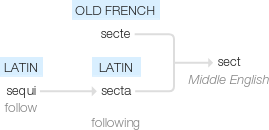Sect
Middle English: from Old French secte or Latin secta, literally ‘following’, hence ‘faction, party’, from the stem of sequi ‘follow’.
wiktionary
From Middle English secte, from Old French secte(“a sect in philosophy or religion”), from Late Latin secta(“a sect in philosophy or religion, a school, party, faction, class, gild, band, particularly a heretical doctrine or sect, etc.”), possibly, from Latin sequi(“to follow”). Alternatively linked to sectus(“cut off, divided”), past participle of secō.
etymonline
sect (n.)
mid-14c., "distinctive system of beliefs or observances; party or school within a religion," from Old French secte, sete "sect, religious community," or directly from Late Latin secta "religious group, sect in philosophy or religion," from Latin secta "manner, mode, following, school of thought," literally "a way, road, beaten path," from fem. of sectus, variant past participle of sequi "follow," from PIE root *sekw- (1) "to follow." Confused in this sense with Latin secta, fem. past participle of secare "to cut" (from PIE root *sek- "to cut"). Meaning "separately organized religious body" is recorded from 1570s.
